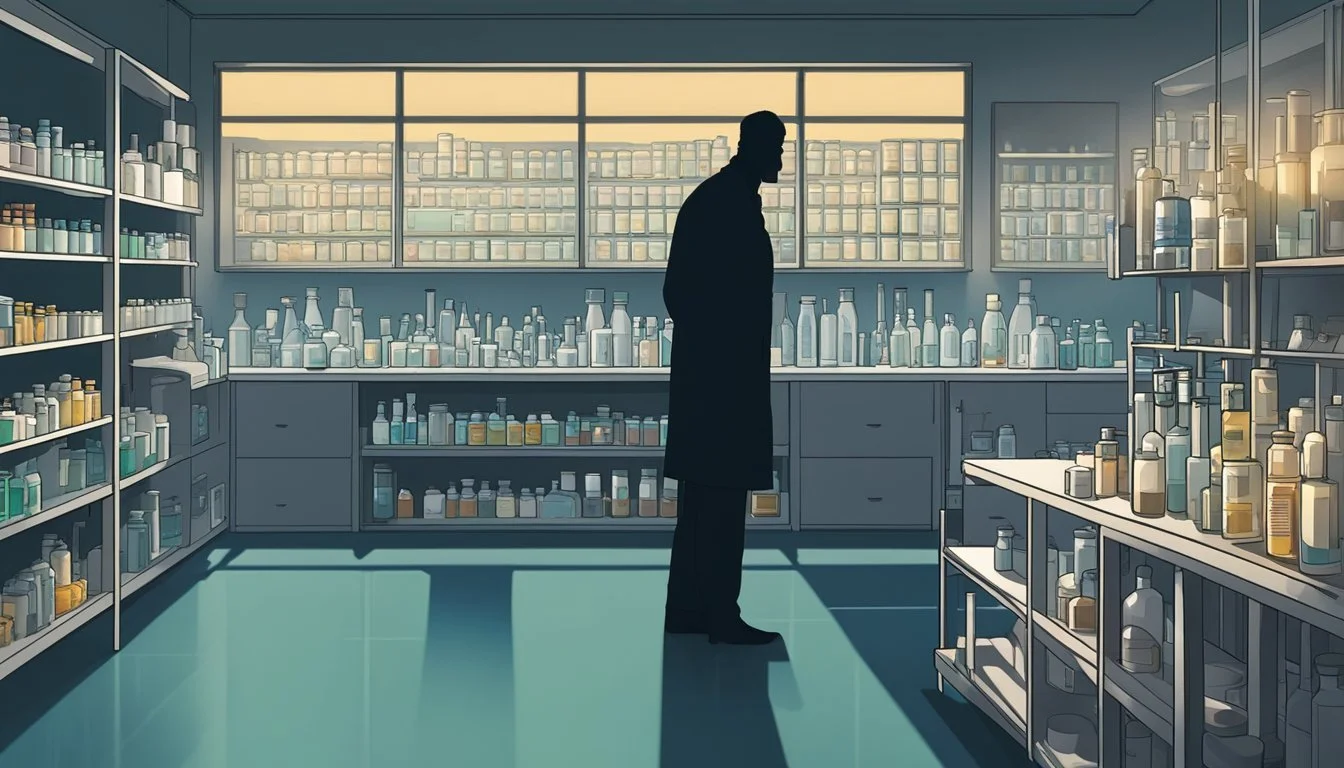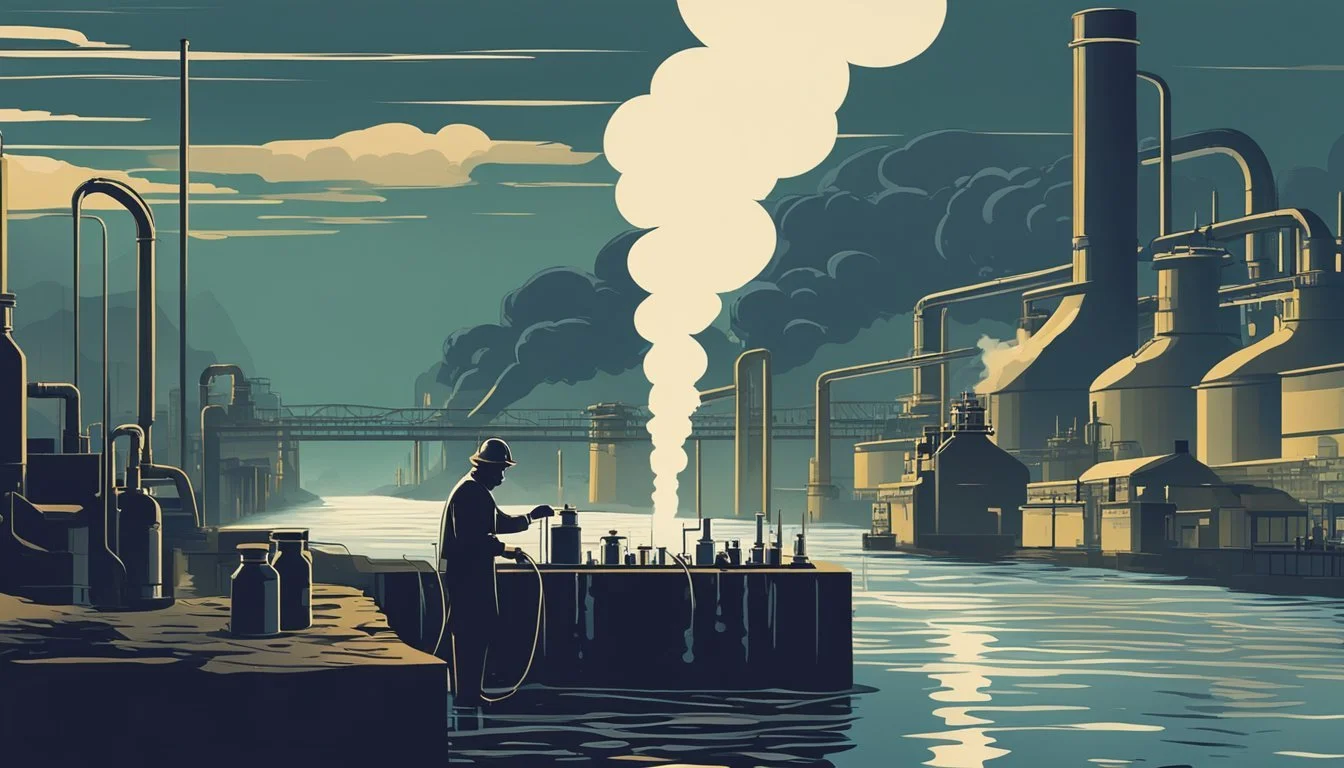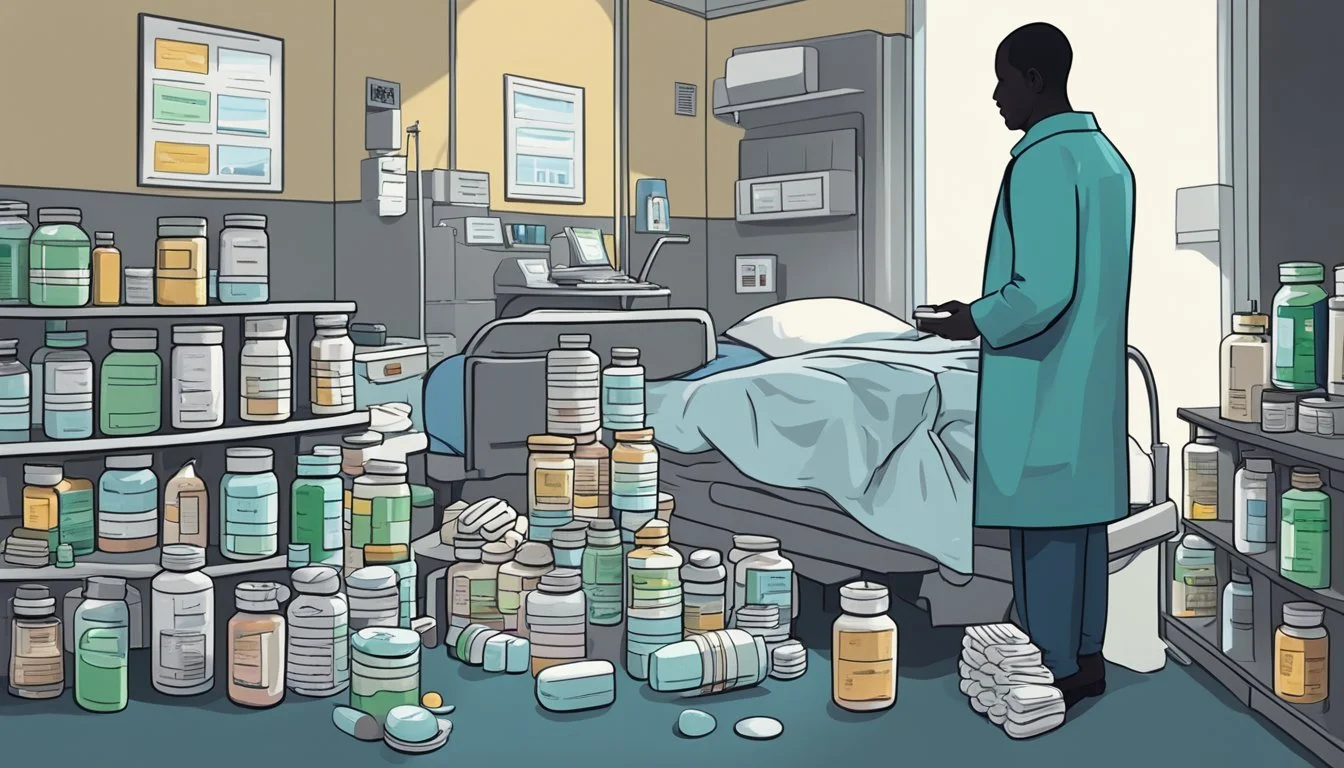12 Documentaries That Expose the Dark Side of the Pharmaceutical Industry
Unveiling Hidden Truths
The pharmaceutical industry plays a vital role in developing life-saving medications and treatments. However, some documentaries have shed light on controversial practices and ethical concerns within the industry. These films explore topics like drug pricing, clinical trials, marketing tactics, and regulatory oversight.
Documentaries exposing the pharmaceutical industry's darker aspects aim to educate viewers and spark important conversations about healthcare. They often feature interviews with industry insiders, medical professionals, patients, and advocates. By examining both historical events and current issues, these films provide a critical look at how drugs are developed, tested, approved, and sold to consumers.
1) 'The Bleeding Edge' by Kirby Dick
'The Bleeding Edge' exposes the dark underbelly of the medical device industry. Released in 2018, this Netflix documentary sheds light on the $400 billion industry's impact on patients.
The film focuses on several devices that have caused harm, including Essure birth control, artificial hips, and vaginal mesh. It reveals stories of individuals who have suffered due to these implants and procedures.
Director Kirby Dick and producer Amy Ziering investigate the lax regulations surrounding medical devices. They uncover a system that often prioritizes profit over patient safety.
The documentary features interviews with victims, doctors, and experts. It highlights the need for increased awareness and stricter oversight in the medical device field.
'The Bleeding Edge' aims to inform the public about potential risks and encourage reform within the industry. It serves as a cautionary tale about the importance of thorough testing and regulation in healthcare.
2) 'Prescription Thugs' by Chris Bell
'Prescription Thugs' is a 2015 documentary directed by Chris Bell, Josh Alexander, and Greg Young. The film explores America's prescription drug abuse epidemic through a personal lens.
Chris Bell, known for his previous work 'Bigger, Stronger, Faster*', takes center stage in this documentary. He shares his own family's struggles with prescription drug addiction, providing a raw and intimate perspective on the issue.
The documentary combines investigative journalism with personal narrative. It examines the role of pharmaceutical companies in the opioid crisis and questions the widespread use of prescription medications in the United States.
Bell interviews medical professionals, addicts, and families affected by prescription drug abuse. He also delves into the marketing tactics used by pharmaceutical companies to promote their products.
'Prescription Thugs' offers a critical look at the American healthcare system and its reliance on prescription drugs. It challenges viewers to reconsider their relationship with medication and the pharmaceutical industry.
[https://www.imdb.com/title/tt4505750/]
3) 'Dirty Money' Season 2 Episode 4: 'Dirty Gold'
'Dirty Gold' exposes the dark underbelly of the gold industry. This episode of Netflix's 'Dirty Money' series reveals how illegal gold mining operations in South America fuel environmental destruction and criminal activities.
The documentary follows the complex supply chain of gold from illegal mines to legitimate markets in the United States. It highlights the devastating impact of these operations on the Amazon rainforest and indigenous communities.
Investigators and journalists uncover links between illegal gold mining and money laundering schemes. The episode showcases how criminal organizations exploit lax regulations to profit from "dirty gold."
'Dirty Gold' presents interviews with law enforcement officials, environmental activists, and industry insiders. It offers a sobering look at the hidden costs of the global gold trade and its far-reaching consequences.
The documentary raises important questions about consumer responsibility and corporate accountability in the jewelry industry. It challenges viewers to consider the origins of gold products and their potential connection to illegal activities.
https://www.netflix.com/title/80118100
4) 'The Pharmacist' by Julia Willoughby Nason and Jenner Furst
'The Pharmacist' is a true crime documentary series that premiered on Netflix in February 2020. It chronicles the remarkable journey of Dan Schneider, a pharmacist from Poydras, Louisiana.
After the tragic loss of his son to drug-related violence, Schneider embarks on a personal mission to uncover the truth behind his son's death. His investigation unexpectedly leads him to expose a larger crisis.
Schneider discovers a "pill mill" operation in New Orleans, where a doctor was overprescribing opioids. His efforts to gather evidence play a crucial role in addressing the opioid epidemic.
Directors Julia Willoughby Nason and Jenner Furst, known for their work on other impactful documentaries, bring Schneider's story to life. They skillfully weave together archival footage and interviews to create a compelling narrative.
The four-part series sheds light on the devastating effects of the opioid crisis and showcases how one individual's determination can make a significant impact. It offers a unique perspective on the pharmaceutical industry's role in the opioid epidemic.
https://en.wikipedia.org/wiki/The_Pharmacist_(TV_series)
5) 'Fire in the Blood' by Dylan Mohan Gray
'Fire in the Blood' is a 2013 documentary that sheds light on the pharmaceutical industry's role in the global AIDS crisis. The film examines how patent monopolies and Western governments blocked access to affordable antiretroviral drugs in developing countries.
Director Dylan Mohan Gray focuses on the period after 1996, when effective HIV/AIDS treatments became available. The documentary argues that this obstruction led to millions of unnecessary deaths in Africa and other parts of the global south.
The film features interviews with key figures involved in the struggle for medication access. These include activists, government officials, and pharmaceutical industry representatives. Bill Clinton and William Hurt are among the notable participants.
'Fire in the Blood' explores the complex interplay of medicine, economics, and politics in the pharmaceutical industry. It raises important questions about the ethics of drug pricing and distribution in global health crises.
The documentary received positive reviews for its informative approach to a critical issue in healthcare access. It serves as a thought-provoking examination of the pharmaceutical industry's practices and their impact on public health.
6) 'Drug$, The Price We Pay' by Jonathan Marshall Thompson
'Drug$, The Price We Pay' is a powerful documentary that sheds light on the high cost of prescription medications in the United States. Directed by Jonathan Marshall Thompson and narrated by J.K. Simmons, the film explores the complex factors behind skyrocketing drug prices.
The documentary features interviews with academics, patients, and former pharmaceutical industry executives. It examines how drug pricing affects people struggling to afford life-saving medications.
'Drug$' delves into the pharmaceutical industry's practices, including patent manipulation and marketing strategies. The film aims to unpack the mystery behind modern medicine's increasing price tag and its impact on public health.
Thompson's work provides viewers with a comprehensive look at the US healthcare system and its relationship with the pharmaceutical industry. It raises important questions about drug accessibility and affordability.
The documentary serves as a call to action, encouraging viewers to engage with policymakers about drug pricing reform. It presents a critical examination of an issue that affects millions of Americans.
https://www.laemmle.com/film/drug-price-we-pay
7) 'Under the Influence' by Diana Abrams
'Under the Influence' examines the rise and fall of YouTube star David Dobrik. The documentary explores how Dobrik's feel-good videos masked a darker side of online celebrity culture.
Director Casey Neistat delves into Dobrik's rapid ascent to fame and the controversies that ultimately led to his downfall. The film highlights the reckless behavior and questionable ethics behind Dobrik's viral content creation.
Neistat's documentary premiered at the SXSW festival in March 2022. It provides an inside look at the pressures and pitfalls of internet stardom in the age of social media influencers.
'Under the Influence' raises important questions about responsibility and accountability in the world of online entertainment. The film serves as a cautionary tale about the potential dangers of unchecked internet celebrity.
https://www.imdb.com/title/tt18925334/
8) 'Pill City: How Two Honor Roll Students Foiled the Feds and Built a Drug Empire' by Kevin Deutsch
Kevin Deutsch's book "Pill City" examines the aftermath of the 2015 Baltimore riots following Freddie Gray's death. It focuses on two high school honor students who allegedly exploited the chaos to build an illegal drug empire.
The book claims these teenagers, known as "Brick" and "Wax," used their computer skills and gang connections to loot pharmacies. They reportedly stole over $100 million worth of prescription opiates during the unrest.
Deutsch's account suggests the pair created an online drug marketplace on the dark web. This allowed them to distribute stolen pharmaceuticals across the country, capitalizing on America's opioid crisis.
The story raises questions about the intersection of technology, crime, and the pharmaceutical industry. It highlights how easily prescription drugs can be diverted to illegal markets.
While presented as non-fiction, some have questioned the veracity of Deutsch's reporting. The book's controversial claims have sparked debate about journalistic integrity in true crime writing.
https://www.amazon.com/Pill-City-Students-Foiled-Empire/dp/1250110033
9) 'American Addict' by Sasha Knezev
'American Addict' examines the widespread prescription drug addiction in the United States. Directed by Sasha Knezev, this 2012 documentary explores the connections between government regulators, pharmaceutical companies, physicians, and the media.
The film presents a startling statistic: while the U.S. makes up only 5% of the world's population, it consumes 80% of the global supply of prescription narcotics. This fact sets the stage for an in-depth look at America's dependence on pharmaceutical drugs.
Knezev's documentary investigates how various entities work together to promote medication-based treatments. It reveals the impact of this approach on both public health and capitalism in the United States.
'American Addict' draws comparisons to other investigative documentaries like 'Inside Job' and 'Food, Inc.' It aims to expose what it sees as hypocrisy within the pharmaceutical industry and its influence on American society.
The film offers a critical perspective on how the United States has become the most prescription-addicted society in the world. It explores the political and business aspects of this issue, providing viewers with a thought-provoking examination of America's relationship with prescription drugs.
10) 'Love and Other Drugs' by Edward Zwick (inspired by real events)
'Love and Other Drugs' is a 2010 romantic comedy-drama film directed by Edward Zwick. The movie is based on Jamie Reidy's non-fiction book "Hard Sell: The Evolution of a Viagra Salesman."
Set in the 1990s, the film follows Jamie Randall, a charming pharmaceutical salesman played by Jake Gyllenhaal. Jamie's career takes off when he begins selling Viagra for Pfizer.
The story explores the relationship between Jamie and Maggie Murdock, portrayed by Anne Hathaway. Maggie is a young woman living with early-onset Parkinson's disease.
Through Jamie's experiences, the film sheds light on the aggressive marketing tactics used by pharmaceutical companies. It depicts how sales representatives often prioritize profits over patient well-being.
The movie also touches on the ethics of drug promotion and the complex dynamics between doctors and pharmaceutical companies. It offers a glimpse into the high-pressure world of medical sales.
[https://en.wikipedia.org/wiki/Love_%26_Other_Drugs]
11) 'Bitter Pill: Why Medical Bills Are Killing Us' by Steven Brill
Steven Brill's 'Bitter Pill: Why Medical Bills Are Killing Us' is a groundbreaking investigative piece published in TIME magazine. The article exposes the complex and often opaque world of medical billing in the United States.
Brill delves into the reasons behind skyrocketing healthcare costs, examining hospital charges, pharmaceutical pricing, and insurance practices. He presents case studies of patients facing exorbitant medical bills, including a $21,000 charge for a false alarm.
The piece sheds light on the lack of transparency in healthcare pricing and the disparities between what hospitals charge and the actual cost of services. Brill argues that the U.S. healthcare system does not operate in a free market, contrary to popular belief.
'Bitter Pill' sparked widespread discussion about the need for healthcare reform and greater accountability in medical billing practices. The article's impact led to further investigations and calls for policy changes in the healthcare industry.
TIME Magazine - Bitter Pill: Why Medical Bills Are Killing Us
12) 'The Truth About the Drug Companies' by Marcia Angell
'The Truth About the Drug Companies' is a book by Dr. Marcia Angell that exposes the practices of the pharmaceutical industry. Dr. Angell, a former editor of The New England Journal of Medicine, draws on her extensive experience to reveal how drug companies have strayed from their original mission.
The book highlights how pharmaceutical companies have transformed into marketing machines focused on profits rather than developing useful medications. Dr. Angell examines the industry's influence on medical research, drug pricing, and healthcare policy.
She discusses the billions spent on marketing to doctors, including free samples and other perks. The author also critiques the industry's claims about research and development costs, arguing that many new drugs are merely variations of existing ones.
Dr. Angell proposes reforms to improve the pharmaceutical industry and ensure better value for consumers. Her work provides a critical look at the relationship between drug companies, medical professionals, and patients.
https://en.wikipedia.org/wiki/Marcia_Angell
Historical Context of the Pharmaceutical Industry
The pharmaceutical industry has undergone significant transformations since its inception. Its evolution has been marked by scientific breakthroughs, changing regulations, and shifting societal needs.
Major Milestones and Developments
The modern pharmaceutical industry traces its roots to the 19th century. In 1820, the isolation of quinine from cinchona bark marked a pivotal moment in drug development. This discovery paved the way for targeted medication production.
The early 20th century saw rapid advancements. In 1928, Alexander Fleming discovered penicillin, revolutionizing infectious disease treatment. Mass production of antibiotics during World War II further accelerated industry growth.
Post-war years brought a surge in drug innovation. The 1950s and 60s saw the development of oral contraceptives, antipsychotics, and vaccines for polio and measles. These breakthroughs significantly improved public health outcomes.
Regulatory Changes Over Time
The 1906 Pure Food and Drug Act in the U.S. marked the beginning of pharmaceutical regulation. This law addressed concerns about adulterated and misbranded drugs.
The 1938 Food, Drug, and Cosmetic Act introduced safety requirements for new drugs. It mandated pre-market safety testing and FDA approval before drug sales.
The 1962 Kefauver-Harris Amendment strengthened regulations further. It required manufacturers to provide evidence of a drug's efficacy and safety before approval.
In recent decades, regulations have focused on expediting drug approvals for rare diseases and life-threatening conditions. The Orphan Drug Act of 1983 incentivized development of treatments for rare disorders.
Ethical Concerns
Documentaries expose significant ethical issues within the pharmaceutical industry, highlighting questionable practices that impact both consumers and healthcare professionals.
Marketing Practices and Consumer Impact
Aggressive marketing tactics employed by pharmaceutical companies raise ethical red flags. Direct-to-consumer advertising often downplays risks while exaggerating benefits. This can lead to unnecessary prescriptions and potential harm to patients.
Some documentaries reveal instances of companies withholding information about drug side effects. This practice puts profit above patient safety and violates the fundamental principle of informed consent.
Price gouging is another ethical concern frequently addressed. Films expose cases where companies dramatically increase prices for life-saving medications, making them unaffordable for many patients.
Influence on Healthcare Professionals
Pharmaceutical companies' relationships with doctors and researchers come under scrutiny in several documentaries. These films expose how companies use gifts, speaking fees, and research funding to influence prescribing practices.
Some documentaries reveal instances of ghost-written research papers attributed to respected physicians. This practice misleads the medical community about drug efficacy and safety.
Clinical trial manipulation is another ethical issue explored. Films show how companies may selectively publish positive results while suppressing negative findings, skewing the perceived benefits of their products.
These documentaries also highlight conflicts of interest in medical education, where industry-sponsored courses can bias healthcare professionals' knowledge and decision-making processes.







